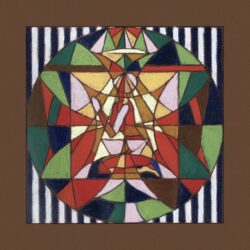Marling’s eighth studio album is a deceptively simplistic offering that permeates a sense of contentment throughout.
 Laura Marling began work on “Pattern In Repeat”, shortly after the birth of her daughter, and first child, back in February 2023. This seismic change to her world lies at the very heart of the new album’s narrative, as it revolves around the collective themes of motherhood, relationships, parenting and ageing. Co-produced by Dom Monks with assistance from strings guru Rob Mosse, the album was recorded at Marling’s home studio in London and exudes an almost symbolic familiarity that is immediately apparent as the opening number ‘Child Of Mine’, begins to the background of congenial chatter and the cooing of Marling’s daughter who is present throughout much of the recording.
Laura Marling began work on “Pattern In Repeat”, shortly after the birth of her daughter, and first child, back in February 2023. This seismic change to her world lies at the very heart of the new album’s narrative, as it revolves around the collective themes of motherhood, relationships, parenting and ageing. Co-produced by Dom Monks with assistance from strings guru Rob Mosse, the album was recorded at Marling’s home studio in London and exudes an almost symbolic familiarity that is immediately apparent as the opening number ‘Child Of Mine’, begins to the background of congenial chatter and the cooing of Marling’s daughter who is present throughout much of the recording.
It is now sixteen years since Marling burst onto the music scene as part of the ‘nu-folk’, movement as it was labelled by the British music press at the time, with her debut album “Alas, I Cannot Swim”, and four years since her last solo studio album “Songs For Our Daughters”. Throughout those intervening years Marling has often cut a reluctant figure in the spotlight, uncomfortable with the trappings of fame, and the music business. Her poetry, starting with the more whimsical of her debut, has grown in maturity with each release, though with a tendency to be delivered all wrapped up in a cloak of introspective seclusion, while the musical arrangements, though never heavy-handed, have been relied on to supply the brightness and levity, often through the chords of an enthusiastically strummed or vigorously plucked guitar.
With “Patterns In Repeat”, there is a subtle, but quite distinct departure from those previous offerings. For starters there is a far greater sense of transparency to the lyrical narrative, Marling’s own personal angst no longer the focal point, instead the constellation of families and how they interact takes centre stage. In turn, this more specified thematic approach offers a far more cohesive balance to the songs, both collectively and individually, than had previously been achieved. Musically the shift is also apparent, with a sparser and starker arrangement, still supportive, but now rather than supplying the tension and release, its design is now to deliver a relatively subtler ambience, guitars picked rather than strummed, with piano-led melodies, all supported by the atmospheric strings.
The other significant difference here lies in Marling’s vocal delivery, which previously, with its juxtaposition of strength and fragility, had occasionally struggled to avoid the aloofness of the stereotypical folk singer. Here it now sounds much more relaxed with a real sense of warmth and joy, and even on the darker numbers such as ‘The Shadows’, there is a soulfulness to her vocals, momentarily drawing comparison to Dusty Springfield at her most broken, or even latter-day Billie Holiday. Elsewhere the poetry conjures up memories of late sixties Leonard Cohen, such as on the reflectively melancholic ‘Looking Back’, whilst ‘Caroline’ mines a similar topic to Tom Waits’ ‘Martha’, though from a distinctly different point of view. Of the eleven tracks, two are instrumentals with ‘Interlude’ being just that, positioned halfway through the album it offers little more than the opportunity to gather one’s thoughts, while the closing refrain delivers a neat conclusion, but nothing more.
Most of all “Patterns In Repeat”, evokes the joys and fears of motherhood, navigating the behaviours one endures through family life, particularly on the aforementioned ‘Child of Mine’, ‘Your Girl’, ‘No One’s Gonna Love You Like I Can’, and ‘Lullaby’. Now freed by parenthood, Marling has been able to shift the narrative subject matter, less self-centred, resulting in an album that feels consequently more inclusive, with greater poetic clarity, and though the sparseness of the arrangement may imply a perceived simplicity, in truth the album continues to reveal with each repeated listen and confidentially sits as her finest offering to date.


